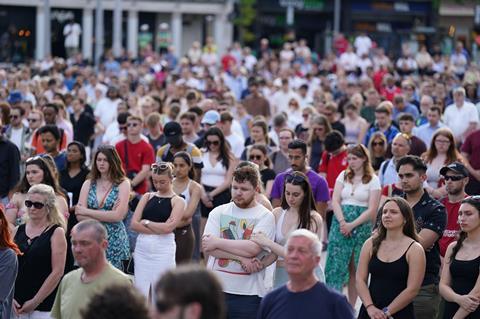In the face of abhorrent evil, such as the Southport murders or the Nottingham attacks, the desire for revenge is a very natural one, says George Pitcher. But what does it look like to stand together, in hopeful solidarity; to acknowledge the pain and work towards something better?

It’s an all too human instinct to seek vengeance against psychopathic killers, especially those murderers of children and youngsters. If we’re honest, we can all feel a primal urge to inflict, in retribution, the pain, death and suffering that they delivered on victims and their families.
That must be why the murderer of the three little girls at a dance class in Southport - Elsie Dot Stancombe, Alice da Silva Aguiar, Bebe King – was reported to have been beaten to a pulp by fellow prisoners. It went momentarily viral with the help of former support-actor Laurence Fox, who writes in short sentences because he thinks in them, claiming he’d heard it “on the grapevine”.
The story was only slightly undermined by such giants of investigative reporting getting the jail where the convicted prisoner is incarcerated entirely wrong.
This is not all there is, we’re working towards something infinitely better
It’s a kind of wishful thinking, if a herd can be said to think. It’s also why we have a rule of law in what we aspire to call a civilised country. It’s there to bring such perpetrators to justice, while ensuring that justice isn’t impaired by the wholly understandable desire of victims’ families to tear their killers to pieces - and the knuckle-dragging, social-media lynch mob who think they know what justice looks like.
Fulfilling the law
It is hard for anyone to know how to respond to this. It’s perhaps particularly challenging, for fear of being intrusive and trite, to see how a religious faith can respond. But I want to have a go. And to avoid those charges of hand-wringing solipsism, I won’t speak of hope and love and life in this context, which so often feels like throwing a handful of seeds into a raging storm.
Rather, I think I want to ask what fulfilment of the law might look like.
The full 240-page report into the killing, in Nottingham in June 2023, by a paranoid schizophrenic of two 19-year-old students, Barnaby Webber and Grace O’Malley-Kumar, and a 65-year-old man, Ian Coates, was published last week. Not unnaturally, the headline theme was that the killer “got away with murder” through a series of chaotic failings by the NHS, in its discharges of its patient into the community, in its absent risk management and failures to medicate him adequately.
Culpability for these crimes is a powerful driving force. But there’s something else going on here. After the report’s publication, the two young victims’ mothers, Sinead O’Malley-Kumar and Emma Webber, went on BBC Radio 4’s Woman’s Hour for an extended interview. And, yes, of course they share a campaigning spirit to change the health system so that this kind of tragedy is less likely to happen again. But Emma said that they’re “not witch-hunting with pitchforks” and Sinead observed with crystal clarity that “systems are made up of people”.
This was about human as well as systemic change
The go-to journalistic word here is “dignity” and, yes, these two mothers have it in bucket-loads. But, as I say, there’s something else. Struggling to identify it, I come up with the phrase that life goes on – and not in its platitudinous sense of bucking up and getting on with what’s left to us. There’s a feeling of continuation, not just of ending, dreadful as those endings are for families.
Asked by interviewer Anita Rani (who, in passing, was first class) what sustained them, where their strength came from, Emma answered in a heartbeat: “Barnaby”, adding in a heartbreaking throwaway: “It’s that invisible umbilical cord.” Similarly, Sinead said she was strengthened on a “bad day” by the knowledge that she was “doing it for Grace.”
Standing together
They know, absolutely, that they can’t change what happened, but they’re there for each other. And not just these two mothers. Bereaved parents from Southport have been in touch, as they said, in “awful solidarity.”
Life goes on – and not in its platitudinous sense of bucking up and getting on with
It is a solidarity unconfined to this dreadful cadre of the violently bereaved. When these two mothers visited Nottingham for a vigil for their lost children, they expected “maybe 50” people to turn up. In the event, there were “thousands and thousands” gathered together in Market Square. One of the two said simply: “There’s more good than bad out there.” Life goes on. Again, not in the sense of pulling your boots up and making the best of it, but in the sense of acknowledging that this is not all there is, that we’re working towards something infinitely better.
I think that’s what fulfilling the law might mean. Not solely changes to human systems, but changes in humanity. And perhaps that makes some sense of the Gospel line: “I have come not to destroy [the law], but to fulfil it” (Matthew 5:17).
Not just to fulfil prophecy; not just to improve legal processes, but to fulfil the immutable laws of humanity for which these two mothers – and so many others around them – work so tirelessly.





































No comments yet